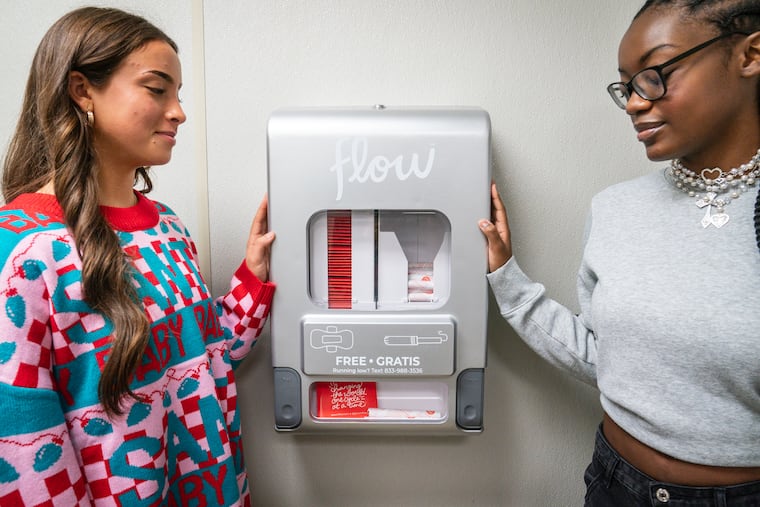How a Haddon Heights student helped push legislation mandating period products in N.J. schools
A new law will make period products free in most N.J. schools in 2024-2025. Some districts are already providing them.

On a typical day in the nurse’s office at Haddon Heights High School, at least several dozen girls stop by with the same emergency: They need menstrual products.
Nurse Margaret Iuvara always has a supply available and encourages girls to take a few extra so they are prepared next time. She can also send girls to three restrooms and the girls’ locker room where, since the spring, dispensers are now stocked with free tampons and pads.
“It’s such a relief to have the products available,” said Macie Madden, 17, a senior. “It’s such a good thing.”
Although the South Jersey school voluntarily provides free period products, New Jersey passed a law signed by Gov. Phil Murphy in August that will require all public schools to offer menstrual products at no cost for students, from sixth to 12th grade. It becomes effective with the 2024-2025 school year.
Advocates who pushed for the law said it was needed to ease the stigma often associated with menstruation and, as part of a national movement, address “period poverty” for girls from low-income households who may not be able to afford such products. Some girls miss school because they don’t have products available, studies show.
Haddon Heights School Superintendent Carla Bittner said the district, which enrolls about 1,500 students in four schools, spent about $2,400 on period products at the high school for this school year. The cost will be picked up by the state when the law takes effect.
“I’m super proud of this initiative,” Bittner said.
The initiative was the brainchild of former Haddon Heights student Anya Raetsch, who was inspired after listening to a NPR podcast about period poverty her sophomore year. When Raetsch had her menstrual cycle for the first time as an eighth grader, she didn’t know she could go to the nurse’s office for help. She eventually got some products from a friend, but wanted to make it easier for other girls.
Raetsch decided to make the campaign her Girl Scout Gold Award community service project and convinced school officials to adopt it. It took months to get the necessary approvals. She held seminars about “period shaming” and surveyed all students, not just the girls, because she believed the issue required support from the entire school.
“I just felt strongly about it,” said Raetsch, 19, of Haddon Heights, now a freshman applied mathematics and computer science major at the University of New Hampshire. “I just got really inspired.”
» READ MORE: Collingswood High School hopes to address mental health concerns with new Wellness Center
Raetsch later pitched neighboring school districts to join the campaign, and several towns, including Collingswood and Haddon Township, also began providing free menstrual products.
Her efforts drew the attention of state lawmakers, and Raetsch was asked to testify about the bill last spring. A few days before she left for college, she was invited to the Statehouse when Murphy signed the bill into law.
“It all just blew up and is getting the attention it deserves,” Raetsch said. “It has forced people to talk about a topic that has been so taboo.”
The dispensers at Haddon Heights High are stocked with 100% organic cotton tampons and pads produced by Aunt Flow, a company that has advocated for free menstrual products in all public restrooms. Founded in 2016 by entrepreneur Clare Coder when she was 18, the company has helped put period products in 23,000 restrooms.
» READ MORE: LGBTQ education is now mandatory in N.J. schools. Here’s how teachers are preparing.
Madden and several other students serve as nurse assistants and help Iuvara keep the dispensers filled. Similar to coin-operated dispensers, the machine rolls out products with a click.
“It’s good to know if you ever have an emergency or need something, it’s there for you,” said Sophie Bordi 16, a junior and softball pitching standout. “It really is expensive for a lot of people. This is definitely something that has helped a lot of girls.”
Iuvara, a former intensive care unit nurse, said some girls prefer to come to her office when they need products. For some, it’s a socio-economic issue, and the products are not available at home, she said.
“I always say, ‘Take a few, be prepared. This is what life is about,’” she said.
Bittner said the initiative has helped promote menstrual equity in the district where about 10% of students are economically disadvantaged. The mother of two sons also believes that more awareness is needed to educate all students, males included.
“Why is this something we are hushed about and embarrassed?” she asked. “This is not something we need to be ashamed of.”
» READ MORE: How the tampon shortage is exacerbating period poverty in the U.S.